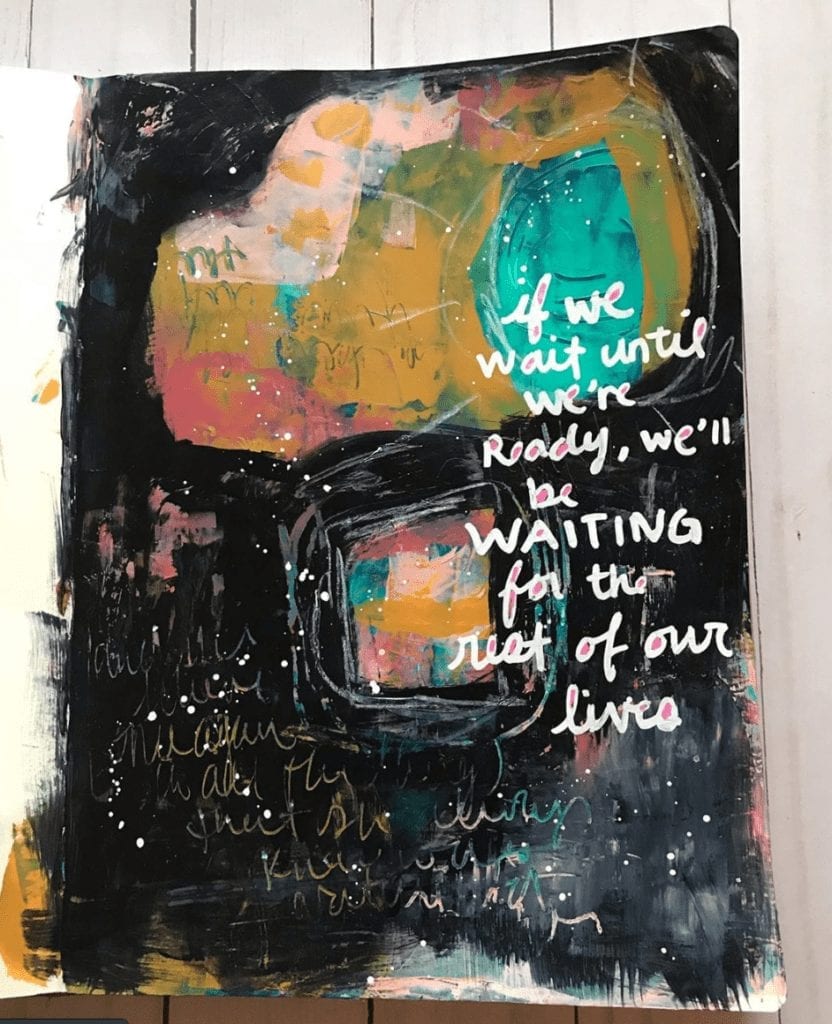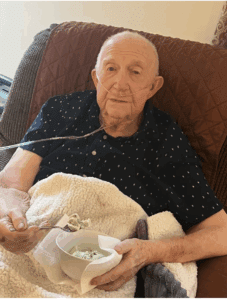When I first met the person who would become one of my spiritual teachers, he told me that I wasn’t ready. I asked him a series of challenging questions from the crossroads at which I found myself in life. I struggled to make sense of deeper yoga teachings that would help me move from a place of doing to being. Ever the good student programmed to challenge what I was told at face value, I persisted with my questioning.
On one hand, he had a point. I hadn’t been ready for quite some time—but I was there. Present. Doing the work. Asking the questions. Preparing myself in a manner that would allow me to become ready. Yet on the other hand, I felt incredibly insulted to be told I wasn’t ready when I was clearly willing and making preparations. It made me think of every time I’d told a client, “You’re not ready yet,” and I suddenly chided myself, realizing how demeaning and degrading that could have felt for them. Since that incident in the Fall of 2015, I stopped using the word ready in clinical settings with my clients or in teaching with my students.
A visceral reaction overcomes me every time that I hear the word ready. Maybe because I realized how ugly it sounded when pelted at me. I also became attuned to how often people say, “I’m not ready.” And I recognized how frequently my clinical consultees, primarily learning EMDR and other trauma therapies, worry that their clients weren’t ready to go further with their work. When they express this worry, the subtext is usually that they do not feel ready to take a client further. Folks that I mentor can doubt their ability to teach a class or accept a professional opportunity I present, claiming they are not ready. Why did I suddenly hate the word so much? In addition to it feeling like an insult towards me, it felt like others were using I’m not ready as an excuse or an easy word to express distrust in their own abilities within the natural flow of process.
For years I taught the importance of client readiness in moving forward with deeper phases of 12-step work or trauma therapy. Yet my experience caused me to reevaluate the word and everything I believed about it. Like I do at any crossroads in inquiry, I turned to word origin for some answers. The word ready traces to the 13th-14th century Middle English where it is largely conflated with the word prepared or preparedness. Although there is an element of the original word usage that also implies promptness; i.e., not dragging out the process. Ready and prepared may seem like synonyms, yet there are subtle differences that may offer some solutions.
I’ve been posing the question quite a bit lately—to my friends and to the hivemind that is my social media following—about the difference between ready and prepared. Most seem to associate readiness as a state of mind or a mental quality whereas preparedness or being prepared is more logistical. There are plenty examples out there of people believing they are ready for something (e.g., marriage, a hike on the Appalachian Trial), only to find out that they are ill-prepared. For me, embracing the full meaning of prepare and all of its forms (preparedness, preparation) is where we find our freedom to grow and to realize our intentions. The Latin root from which we draw the English word prepare draws from the same root as to parent. To bring something to life! Taking the action to get ourselves prepared inevitably impacts our attitude of readiness. If we declare that we’re not ready and do nothing to get ready (i.e., prepare), we can find ourselves in an excuse-making loop for years. Moreover, consider that such a thing as perfect readiness may not even exist.
Amber Coulter, an artist I follow on Instagram, recently published one of her visual journaling pages that declared, “If we wait until we’re ready, we’ll be waiting for the rest of our lives.” My body rejoiced with an enthusiastic YES when I read those words. The answer to the question of why I held so much disdain for the word “ready” began to take shape. A few weeks later I taught a workshop on my Trauma and the Twelve Steps book. A participant posed a question about readiness to do the steps, especially the fourth and fifth step (the inventory and sharing the inventory with another human being steps).
“Who is ever really ready to do a fourth step?” I replied.
I offered that letting people off the hook from doing a fourth and eventually a fifth step is not the answer. Rather, how can we better prepare them for the challenges of these steps and guide them through the difficulty? I’ve heard too many sponsors tell people to “just do Step 4 and don’t come back until you’re ready to do the fifth.” With that lack of guidance, no wonder that people don’t feel ready and keep putting it off! To be clear, forcing people to do the steps is not the answer. I still believe there is value to not rushing any process. Yet playing the “I’m not ready” card, even if it is out of legitimate fear, can keep us stuck in the rut of life behaviors and emotional states that cause us problems. I have found that doing these steps are a lot less scary with proper preparation and guidance. Preparation and guidance can assuage the fear.
What if we could learn to replace the declaration of “I’m not ready” with the question “What can I do to get myself prepared?” There are other helpful questions too: “What kind of support will I need to grow into readiness?” or “How will taking action and making necessary preparations help me to get ready?”
The founder of EMDR therapy, the late Dr. Francine Shapiro, made a brilliant move when she named Phase 2 of the therapy Preparation instead of Stabilization. While many other trauma modalities use terms like stabilization, I find that this word can frustrate clinicians and clients alike. Clinicians can believe that a client has to be totally stable before they can handle deeper phases of trauma healing. Yet it may be impossible to achieve stability in a total sense until the person whose life is ruled by unhealed trauma engages in some deeper healing that allows them to process the impact of their trauma. When new trainees pose the very common question, “Are they stable enough?” or “Are they ready?” to handle deeper level EMDR, I generally respond with, “What are you doing to help them prepare? Remember, the phase is called Preparation. The objective is for the client to acquire enough mental resources and skills so that they can reasonable handle or tolerate what may come up when the work gets harder.”
I assure my clients, and pass this along to my trainees, that if they begin the deeper journey and realize they are not adequately prepared, we can always take refuge back in the Preparation phase and work on more skills and strategies. To simply say “I’m not ready,” especially when you have a goal of getting better, is generally not helpful. True, some people just need some time. Yet I encourage people to productively use that time by taking proactive steps, no matter how small, towards their own healing.
Perhaps my overachieving, good student tendencies that I’ve carried throughout childhood have simply carried over to how I approach the healing process. I recognize that my tone in this piece may come with an air of “no excuses” and I am aware of my privilege. Since I decided to get sober and well 18 years ago, I’ve had the ability to access healing resources in the form of counseling, psychiatry, 12-step meetings and other holistic practices. I also had seasons of my life where unhealed trauma rendered me paralyzed and unable to fully take advantage of them. Yet realizing what I do have and mustering enough willingness to prepare myself has long been the key that’s opened the door to readiness. I’ve seen people without the resources I have access to make up for it the willingness to prepare themselves in whatever way is possible. Which leads to a final question: When we say, “I’m not ready,” are we really declaring that we’re not willing?
Maybe. Maybe not.
I’ve seen the answer to that question go both ways for people. And in both contexts, the lynchpin seems to be preparation. Taking action steps. Change will come as it is meant to when we put one foot in front of the other with a minimum of stalling. There’s a recovery saying that it’s easier to act your way into better thinking than to think your way into better acting. This approach is generally more trauma-informed than change the thinking, change the behavior mantra that can dominate cognitive-behavioral discourse. Acting your way into better thinking recognizes that our thoughts keep us stuck. Our thoughts tell us things like “I’m not ready.” Our actions move us towards a different reality and eventually a different attitude and outlook on life.















2 Responses
When I first started helping people through trauma work, I followed the instructions in the training to just jump in. I had a couple of clients who were not ready, and they did not complete trauma therapy. I tend to test the waters now with people, and most people are not ready right off the bat. I would respect the perspective of a client who told me they were ready and give them a shot to try to approach the trauma and to identify if they aren’t ready, what do they need to be ready. I also help them see through the process, what it is that they need to be ready. So far all of my clients have appreciated the tailored preparation process based on their individual needs. When I come across a client that does not benefit from the preparation process, it will be an opportunity to learn something new.
I work from a psychodynamic approach and often lean into exploring the particular fears that might be keeping a client from feeling ready to go deeper. This conversation alone opens the door ever so slightly so we can begin to understand, honor, and validate their hesitancy. I see this whole process as trauma work – all the way from initial conversations that are simply explorations of fears to discussing actual trauma-related memories or experiences.
Though I would never encourage a client to go deeper than they feel they are ready to, I also feel it is important for them to know they are capable of hard things with proper supports in place. Sometimes saying “I’m not ready” is more of a blanket statement for “I’m not sure I know my own capacity/resources/strength”.